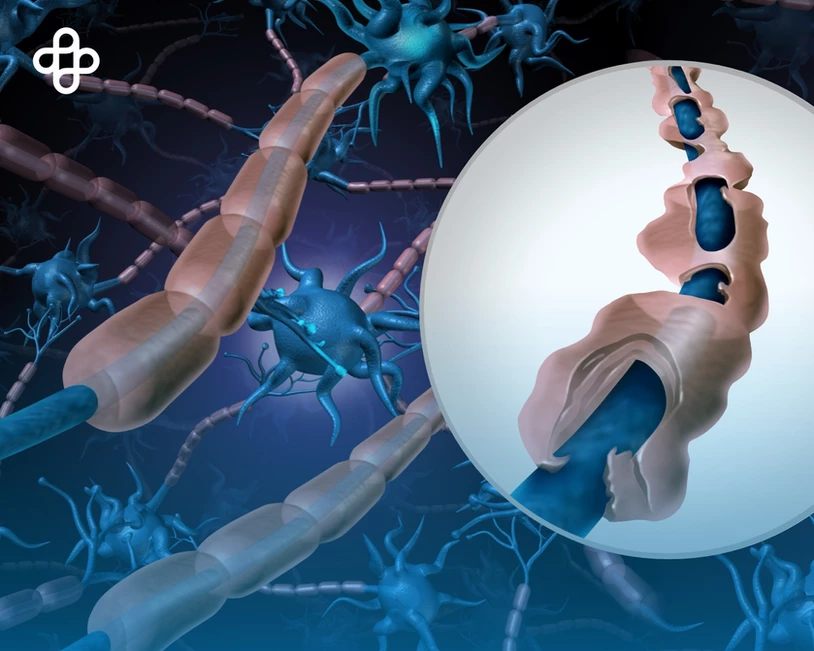Understanding the Causes of Multiple Sclerosis:
Complex genetic risk profiles in individuals, combined with environmental factors, trigger multiple sclerosis (MS). Approved disease-modifying agents reduce the frequency of new episodes, but they do not reverse fixed deficits and have questionable effects on long-term disability accumulation and disease progression as detailed in the article “Multiple Sclerosis,” published in the specialized journal The Lancet.
The medical community continues to investigate the causes of multiple sclerosis (MS). A disease that attacks the central nervous system, causing motor disability and cognitive impairment. Learn more about this condition that affects 2.8 million people worldwide.
The causes of multiple sclerosis
The causes of multiple sclerosis are not yet fully defined, but it is believed to occur when the body’s defenses attack the myelin. Myelin is the tissue that protects the nerve fiber of the central nervous system.
When damage occurs to myelin, it distorts and interrupts nerve impulses traveling between the brain and the spinal cord. Currently, treatments are not only palliative; significant progress has been made, and there are oral, intravenous, and intramuscular therapies targeting the best-known mechanism of action, which is the immune response.
What Happens to a Person with Multiple Sclerosis?
Multiple sclerosis damages myelin, an insulating layer that forms around the nerves of the central nervous system: the brain and spinal cord. In other words, it acts as a protector, just as the insulation of an electrical cable does.
Precisely, the central nervous system is responsible for processing our thoughts and all the information we obtain through our senses. Therefore, it allows us to recognize ourselves as individuals, and be aware of who we are, what we feel, and what we do.
This is how the loss of myelin – demyelination – alters the nerves’ ability to conduct electrical impulses to and from the brain. Messages do not travel with the necessary speed and fluidity because the brain is unable to communicate with the rest of the body.
Multiple sclerosis is considered an autoimmune disease in which the body’s immune system attacks its tissues. In the case of multiple sclerosis, this malfunction of the immune system destroys the fatty substance that coats and protects the nerve fibers of the brain and spinal cord, known as myelin.
We can compare myelin to the insulating layer covering electrical cables. When the protective myelin is damaged and the nerve fiber is exposed, messages sent through that nerve fiber are slower or interrupted.
It is not clear why multiple sclerosis manifests in some people and not in others. It seems to be due to a combination of genetic and environmental factors.

Causes of Multiple Sclerosis Risk Factors
The following factors may increase the risk of having multiple sclerosis:
Age. Multiple sclerosis can occur at any age, but its onset usually occurs around 20 and 40 years of age. However, individuals of younger and older ages may be affected. Sex. Women are two to three times more likely than men to have relapsing-remitting multiple sclerosis. Family History. If one of your parents or siblings had multiple sclerosis, your risk of having the disease is higher. Certain Infections. Various viruses are associated with multiple sclerosis, including Epstein-Barr, which causes infectious mononucleosis. Race.
White individuals, especially those of Northern European descent, are at higher risk of having multiple sclerosis. People of Asian, African, or Native American descent are at lower risk. Climate. Multiple sclerosis is more common in countries with temperate climates. Including Canada, northern states of the United States, New Zealand, southeastern Australia, and Europe. Vitamin D. Having lower levels of vitamin D and less exposure to sunlight is associated with a higher risk of multiple sclerosis. Certain Autoimmune Diseases.
You have a slightly higher risk of developing multiple sclerosis. If you have other autoimmune disorders, such as thyroid disease, pernicious anemia, psoriasis, type 1 diabetes, or inflammatory bowel disease. Smoking. Smokers who experience an initial event of symptoms that may indicate multiple sclerosis are more likely than non-smokers to have a second event confirming relapsing-remitting multiple sclerosis.
Finally, If you want to know more, visit our article on What Are Stem Cells.





